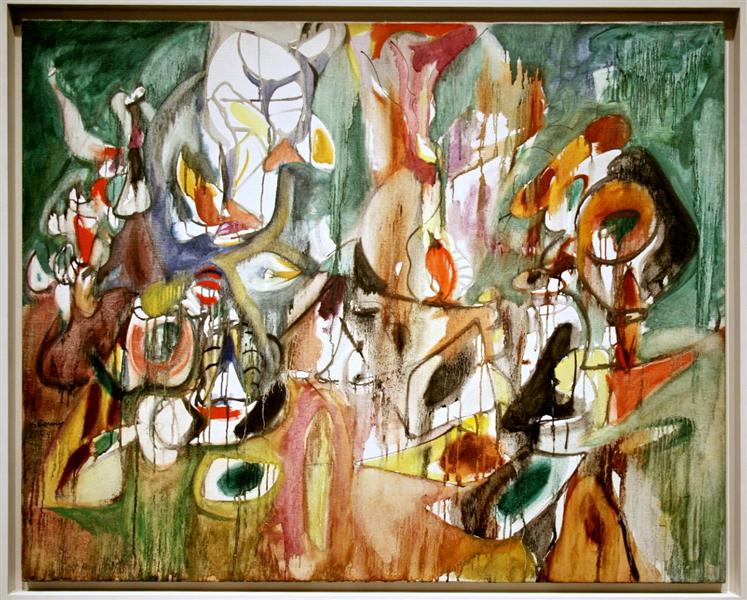Description
The work "One year the Algodoncillo" (1944) of Arshile Gorky is erected as a monumental testimony of surrealism and the abstraction of the twentieth century, characteristics that are amalgamated to offer a unique and innovative visual language. Gorky, a pioneer of abstract art and a mentor of American abstract expression, reflects this work not only his technical ability, but also his deep link with nature and emotional pain that characterized his personal life at that time.
In a first glance, the composition of the painting is presented as a dream landscape where interactions between organic forms and the gestural use of color are produced. Gorky uses a vibrant palette that includes intense green, yellow, red and blue tones, each of them impregnated with a luminosity that seems to breathe life. The disposition of these colors is not arbitrary; They are organized in a visual dance that evokes the growth of plants and the flow of life itself, referring to their fascination with the algodoncillo growth cycle, which symbolizes both the ephemeral and renewal.
Although the work does not include human figures in its traditional form, the forms and contours that emerge on the canvas suggest an inhabited world; Each line seems to refer to the essence of the living, where the abstract becomes an echo of what is familiar. The elongated and curvilinear forms can remember the biology of plants, while dynamic strokes give the impression of an incessant movement: the life cycle that Gorky so well captured in his work. This can also be interpreted as a reflection of the uprooting of the artist himself due to his experience as an immigrant, who, through his art, sought to forge a connection with his new homeland.
The use of the texture in "one year the algodoncillo" is remarkable. Gatchy applies layers of paint with great freedom, creating an almost tactile effect that invites the viewer to explore the canvas surface beyond the visual. This technique is aligned with its admiration for the works of the surrealists, who promoted the idea that art should arise from the subconscious, since the act of painting becomes an automatic and intuitive process. The spontaneity with which Gorky applies the pigments and draws their forms evokes the footprint of a fluid and organic thought, where each element becomes a reflection of its own psyche.
"One year the algodoncillo" can also be understood within the broader context of Gorky's work, who in the 1940s experienced significant changes both emotional and aesthetic. Painting can be seen as an expression of a moment of deep introspection, capturing the essence of life and its challenges with a lyrical and almost philosophical approach. Gorky, who lost his mother during his youth, often looked for an emotional refuge in nature, and here, that search materializes in a canvas that, despite its abstraction, resonates with a palpable vitality.
In conclusion, "a year the algodoncillo" is not only a representation of the technical talent of Arshile Gorky, but also a reflection of his personal and philosophical struggles. The work highlights the interconnection between the human being and the natural environment, underlining the need to find beauty in the ephemeral and the emotional burden that the creative act may imply. Through this piece, Gorky manages to transcend the mere representation to enter the field of metaphorical, leaving an indelible mark on the melting pot of modern art. His legacy lasts, inviting each spectator to immerse himself in a continuous dialogue with painting and, in this way, with life itself.
KUADROS ©, a famous paint on your wall.
Hand-made oil painting reproductions, with the quality of professional artists and the distinctive seal of KUADROS ©.
Art reproduction service with satisfaction guarantee. If you are not completely satisfied with the replica of your painting, we refund your money 100%.

